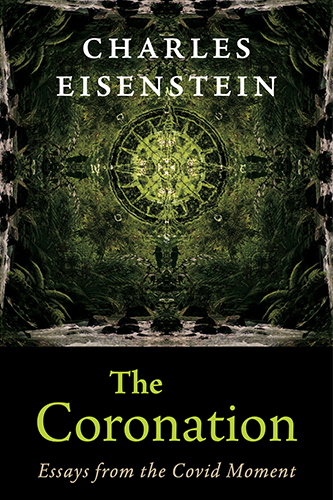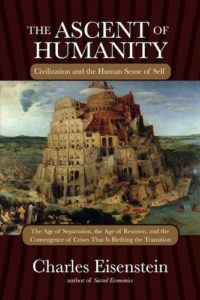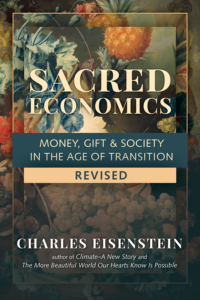The Ascent of Humanity
Chapters
Chapter 4: Money and Property
The Crisis of Capital
The logic of interest is the logic of an addict. It assumes that always and forever, we will find some way to feed an endlessly growing need to consume. We will always be able to find some new resource, some new form of capital to convert into money. Like the craving of an addict, interest demands that more and more of life be directed toward feeding it. I’m not just speaking metaphorically here, as anyone knows who bears heavy student loans or credit card debt. “More and more of life is directed toward feeding it.” Interest enforces the perpetual sacrifice William Wordsworth understood as a key feature of Machine civilization. The higher that interest rates are, the more powerful the exigency that speeds the conversion of social and natural capital into money.
The longer any addiction is maintained, the greater the depletion of life, and the more extreme the measures required to perpetuate it. Just as the addict cashes in life insurance policies, borrows money from friends, and eventually converts every physical resource and social resource into money, so also does our civilization seek out every possible source of unexploited social, natural, cultural, and spiritual capital. However good our intentions to preserve it, interest generates an unstoppable force that assails it from all directions, always seeking a way in.
Marxism describes this process and its inevitability in terms of the imperative of (financial) capital to constantly find new domains of exploitation in order to delay the crisis of falling profits, destructive competition, and concentration of ownership. The endless growth demanded by our system of money and property, the endless conversion of life to money, conceals a latent contradiction that has been known since the inception of the Industrial Revolution. This is the crisis of overproduction, described explicitly by Karl Marx, but also frankly discussed by industrialists and their intellectuals to the present day.
Simply put, under the present system of money and property, it is generally to the individual producer’s advantage to produce as much as possible to take advantage of economies of scale—the hallmark of industry. Yet when every producer does this the result is overproduction and hence falling profits, falling wages, bankruptcies, concentration of ownership, unemployment, and finally, to complete the vicious circle, falling demand. Marx foresaw it all culminating in a revolution, when the misery entailed in the above trends became unbearable to enough people. Faced with this possibility, capitalistic society is driven by an organic imperative to postpone—hopefully indefinitely—the frightening denouement predicted by Marx. One way to do this is to limit production (for example by raising interest rates or through a command economy); another is to incinerate overproduction through warfare; a third is to find “new markets” through technology or imperialism. The first cannot work because, most fundamentally, it is inimical to our money system and its demand for endless growth, and thus sparks the very deflationary crisis it means to avoid. The second option works just fine, but requires an endless intensification that came to an end with the advent of thermonuclear weapons. The continual state of war that exists today is insufficient to absorb an exponential increase in production.
That leaves us with the third option. The imminent and inevitable revolution that Marx predicted has not come about, principally because technology has constantly created fresh new markets. Each time, a new industry starts off with a vibrant pandemonium of myriad competing firms, providing new jobs, new wealth, new opportunities for entrepreneurship. Eventually, firms fail or merge, profit levels fall, and layoffs set in, but by this time some new sector of the economy has emerged to take up the slack. Marx’s analysis thus appears to be quite accurate in describing the evolution of a particular industry, but inapplicable to the economy as a whole as long as there are always new technologies, new industries, and new markets.
Is there a limit to the ability of technology to open up new domains for capital investment? If not, then Marx’s crisis of capitalism will never arrive. But if we understand technology as a means to convert non-monetary forms of capital into financial capital, then there will come a point when these other forms of capital are exhausted. In other words, what has been going on all along is not the creation of new wealth, but the conversion of existing (non-monetary) wealth into monetary wealth to give “capitalism” a lease on life. I have argued that “new” sectors of the economy usually involve the transfer of things people once did for themselves into the hands of specialists. What will happen when there is no more to be transferred?
The situation is closely analogous to the standard Marxist explanation of colonialism and imperialism. In Marxist theory, when a country has developed to a certain point, the mounting crisis of lower and lower returns on investment and falling profits generates enormous pressure to find new areas where wages can go still lower, where raw materials can be extracted still more cheaply, where there is new demand for the overcapacity of industrial products, and where prices have not been driven near the break-even point by extended competitive pressure. In other words, the crisis is exported to a colony and temporarily relieved until that colony too has no more to offer in terms of lower wages, cheap resources, etc.; i.e. when all its social, cultural, natural, and spiritual wealth has been taken from it. Eventually the developed nations would run out of colonies; then, the Marxists said, finally we will have our Revolution.
Unrecognized by the classical Marxist thinkers was another kind of colonization that has happened simultaneously with the geographical: the colonization of non-physical territories. The nature of financial capital, which is written into our current system of money, which is itself a projection of the way we understand the universe, constitutionally requires constant growth. Maintaining the growth machine requires constantly finding new sources of demand. These can be found in other countries for existing products; alternatively, new demand can be created at home by finding “unmet needs” (as they are called in standard economics). But what is an unmet need? Usually it is some aspect of our humanity that already exists—it is not really new—but that has heretofore existed outside the money economy. In other words, it is a form of wealth that has not yet been converted to money.
William Greider, Daniel Korten, and many others argue persuasively that the crisis of capitalism is already imminent. Greider in particular, writing in 1998, gives a compelling account of all the elements of the Marxian crisis: overcapacity of production, falling profits, concentration of ownership, and the downward spiral of wages on a global scale.[48] Eight years later, the deflationary depression he warned against has not come to pass—and not because any government took his prescriptions. But perhaps it is not that Greider was incorrect, but only that he underestimated the non-geographical domains that have not yet been fully colonized.
The Socialist solution to the Marxian crisis fails because it doesn’t get at the root of the problem, which is not the private ownership of property but rather the concept of property to begin with. And the concept of property, as we have seen, itself depends on our definition of ourselves and the way we understand the world. Greed, competition, anxiety, and scarcity are built into our cosmology and our science, and will not go away until and unless the other pieces of the pattern change as well. Specifically, they will not go away when we see the world, nature, language, thought and idea as things that can be cordoned off and owned as objects.
The characteristics of capital upon which Marx based his theory stem from the characteristics of the money system that currently dominates, which features a “scarce” interest-bearing currency created by banks. Very different economic dynamics would result from a money system with different characteristics, and a different money system will spring forth naturally from a different understanding of and relationship to the world. A very different form of capitalism will then emerge, to which Marx’s dynamics do not apply, which fosters cooperation over competition, sharing over exploitation, community over separation; in other words, which values and develops all the non-monetary forms of wealth described herein. It will be a system that makes us richer in life rather than poorer in life but richer in money. And significantly, it will be a system that is not designed in the usual sense but which is allowed to grow. This is the true revolution: not a superficial overthrow of whatever powers happen to be, but a radically new understanding of self and world. Marx criticized the bourgeois revolutions of America and France for merely replacing one set of owners with another. Yet isn’t his own revolution similarly shallow, leaving untouched the concept of property, the duality of labor and leisure, the ideology of growth, and the assumption of human domination over nature?
Why is such a deep revolution necessary? The history of technology, at least back to agriculture and probably back to the pre-human technologies of fire and stone, is closely linked to an increasing objectification of the world. We conceptually separate ourselves from the environment in order to manipulate it; equally, our successful manipulation of the environment spurs our conceptual separation from it. The concept of property naturally flows out of such an objectification, and the kind of money we have today arises naturally out of such property, which is mine and not yours, which can be accumulated and measured. It is foolish to think that any system other than the capitalism we are familiar with could arise from such a prior foundation.
A revolution that leaves our conceptualization of self and world intact cannot bring other than temporary, superficial change. Only a much deeper revolution, a reconceiving of who we are, can reverse the crises of our age. Fortunately, to use the language of Marx, this deepest of all possible revolutions is inevitable, and it is inevitable for precisely the reasons Marx foresaw. The conversion of all other capital into money is unsustainable. Someday it will run out. As it does, our impoverishment will deepen. Misery and desperation will overcome whatever measures can be invented to suppress or narcotize them. When at last the futility of controlling reality becomes apparent, when at last the burden of maintaining an artificial self separate from nature becomes too heavy to bear any longer, when at last we realize that our wealth has bankrupted us of life, then a million tiny revolutions will converge into a vast planetary shift, a rapid phase-transition into a new mode of being.
It will happen—must happen—perhaps sooner than we think. Indeed it is already happening. Our social, natural, cultural and spiritual capital is almost exhausted. Their depletion is generating crises in all realms of modern life, crises which are seemingly unconnected except that they all arise from the monetization of life or, underneath that, from our fundamental confusion as to who we are, our separation from nature, ourselves, and each other. This is the link that connects such disparate phenomena as peak oil,[49] the autoimmune disease epidemic, global warming, forest death, fishery depletion, the crisis in education, and the impending food crisis. Both monetization and separation are nearing their maxima, their greatest possible extremes. The former is in the completion of the conversion of common wealth into private wealth that I have described in this chapter; the latter is in the complete sense of isolation and alienation implicit in the world of Darwin and Descartes: the naked material self in a world forged by chance and determinism, where purpose, meaning, and God are, by the nature of reality, nothing more than self-delusory figments of the imagination.
Paradoxically, it is in the fulfillment of these extremes (each of which is a cause and an aspect of the other) that their opposites are born. Yang, having reached its extreme, gives birth to Yin. The depletion of social capital launches the revolution that will reclaim it. The agony of separation births the surrender that opens us to a larger version of the self, to nature and to life. But the extremum must be reached.
As any environmental scientist knows, it is certain that things will get much much worse for the bulk of humanity before they get any better. Certain forces must play themselves out. The momentous rise in spiritual, humanitarian, and ecological awareness will not save us, not because it is too late (though it is), but because the course of separation has not yet reached its finale.
Like an alcoholic whose resources of goodwill, money, pawnable assets, friends, and credibility are almost exhausted, our way of life is on the verge of collapse. We continue to scramble, applying new technological fixes at greater and greater cost to alleviate the problems caused by the last fix. The addict will keep on using until life becomes completely unmanageable. Ecological awareness, localism, green design, herbalism, community currencies, ecology-based economics are all like the drunk’s moments of clarity on the way down. They will not so much save us as serve as the seeds for a new way of living and being that we will adopt after the collapse. Indeed they will all come naturally, as a matter of course—if there is anything left at all.
[48] Greider, William, One World, Ready or Not
[49] This refers to the fact that oil product will soon reach, or has already reached, its peak level of production. Petroleum geologists are nearly unanimous in asserting that discoveries of new reserves cannot possibly keep pace with the depletion of old reserves. See www.fromthewilderness.com for more details.






